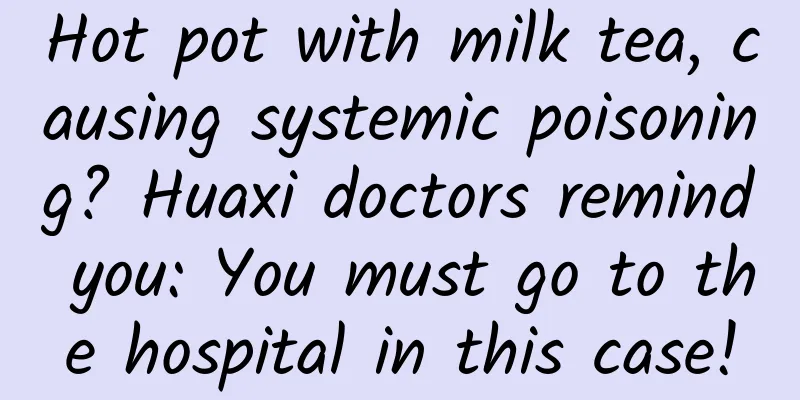A "minor cold" causes indicators to soar, 10,000 times higher than normal values. Be alert to the onset of myocarditis!

|
Recently, a girl in Guangdong had persistent coughing symptoms. She thought it was a common cold, but it didn't get better. She went to the hospital for a checkup and was diagnosed with myocarditis, with indicators 10,000 times higher than normal. After a month of treatment, she was out of danger, but left with sequelae and needed to take medication for life. This case reminds us that seemingly common cold symptoms may hide serious health problems. At the same time, a study published in the journal Circulation analyzed more than 56,000 hospitalized COVID-19 patients in 23 hospitals in Europe and the United States and found that 2.4 out of every 1,000 people clearly/probably developed acute myocarditis. The study mentioned that the most common symptoms of these patients with acute myocarditis were chest pain and dyspnea, and some patients did not develop related pneumonia. This study emphasizes that myocarditis is a complication that needs to be vigilant in viral infections. Similarities and differences between colds and myocarditis Colds are generally caused by respiratory viruses, such as influenza virus, adenovirus, etc. These viruses not only cause upper respiratory tract symptoms, but may also invade the blood and attack myocardial cells, thus causing myocarditis. Myocarditis can be chronic, acute or fulminant, of which fulminant myocarditis is the most serious, with an acute onset, rapid progression and a high mortality rate. The initial symptoms of fulminant myocarditis are similar to those of the common cold, including body aches, runny nose, headache, fever, etc., but heart failure or severe arrhythmias quickly develop afterwards. In addition, it may also be accompanied by multiple organ failures such as lung, liver, and kidney. The prognosis of fulminant myocarditis is related to many factors, including the patient's clinical manifestations, multiple clinical parameters, and endomyocardial biopsy results. Don't treat myocarditis as a common cold Cold symptoms: usually include cough, runny nose, sore throat, fever, etc. Symptoms of myocarditis: In addition to cold symptoms, you may also experience palpitations, chest tightness, chest pain, shortness of breath after activity, difficulty breathing, fatigue, etc. Severe myocarditis may cause sudden fainting and refractory shock. Who are the susceptible groups? 1. Young and middle-aged people: Although myocarditis can occur at any age, studies have shown that young and middle-aged people, especially those aged 16 to 30, are more susceptible to fulminant myocarditis. This group of people are usually highly active and have frequent social contacts, which increases the chance of viral infection. At the same time, young and middle-aged people often ignore minor physical discomfort and delay seeking medical treatment, which may aggravate the development of myocarditis. 2. People with impaired immune systems: People with impaired immune systems, such as cancer patients who have undergone chemotherapy or radiotherapy, have their immune system functions suppressed and are unable to effectively resist viral infections. In addition, patients with autoimmune diseases (such as systemic lupus erythematosus and rheumatoid arthritis) are also at high risk. 3. Patients with chronic diseases: People with chronic diseases such as diabetes, hypertension and cardiovascular diseases have poor underlying health conditions, their hearts are less resistant to viral infections and are more susceptible to myocarditis. 4. Pregnant women: Pregnant women have an increased cardiac burden and their immune system changes during pregnancy. At the same time, myocarditis during pregnancy not only affects the health of pregnant women, but also has adverse effects on the fetus. 5. Elderly people: As they age, their immune systems gradually weaken and they often have multiple chronic diseases. At the same time, they may not be as sensitive to symptoms, leading to delayed treatment. The treatment of myocarditis mainly relies on supportive therapy and the self-repair of the immune system. If symptoms of suspected myocarditis occur, you should seek medical attention immediately. Treatment measures include: Rest: adequate rest helps the myocardium recover; Drug treatment: use of antiviral drugs, immunosuppressants, etc. Nutritional support: Maintain good nutritional status and support physical recovery; Monitoring and follow-up: Regular electrocardiogram, cardiac ultrasound and other examinations are performed to monitor heart function. In summary, although colds and myocarditis have similarities, the severity and danger of myocarditis are much higher than the common cold. Understanding the difference between the two and identifying the early signs of myocarditis in time are of great significance for prevention and treatment. |
<<: These "grapes" are free, but they can cost you your life!
Recommend
I heard you love "pan skewers"? Be careful, pan will hurt...
Come and see my recent favorite - all kinds of sk...
What are the causes of high leukocyte count in gynecology?
When a woman has sex after marriage, the bacteria...
Do I need to express the milk when I am weaning?
When weaning, many mothers will experience breast...
Normal value of pregnancy-associated protein a
Protein A is the most important trace element in ...
How to take care of yourself after uterine fibroid surgery?
A healthy body is very important for everyone. Gy...
High creatinine in pregnant women
During pregnancy, for the health of both the moth...
Are snow lotus seeds and sapodilla rice the same thing? How to extract sapodilla rice from dried sapodilla
Saponin rice, commonly known as snow lotus seeds,...
What causes postpartum stretch mark pain?
Stretch marks are a type of wrinkles on women'...
How to treat acne on forehead
Many office workers often need to stay up late an...
Suddenly, my menstrual flow is very light
Generally, the amount of menstrual flow for girls...
What is the reason for premature menstruation?
We all know that due to the structure of the fema...
Can women drink dandelion water during breastfeeding?
Any behavior or daily diet of a breastfeeding wom...
Gestational age and amniotic fluid index comparison table
The amniotic fluid of pregnant women plays an imp...
How long does it take for barbecue to enter breast milk?
Because breast milk is rich in nutrients, many mo...









